新概念英语青少版2B:Unit 27 Pocket money 课件(68张PPT)
文档属性
| 名称 | 新概念英语青少版2B:Unit 27 Pocket money 课件(68张PPT) |
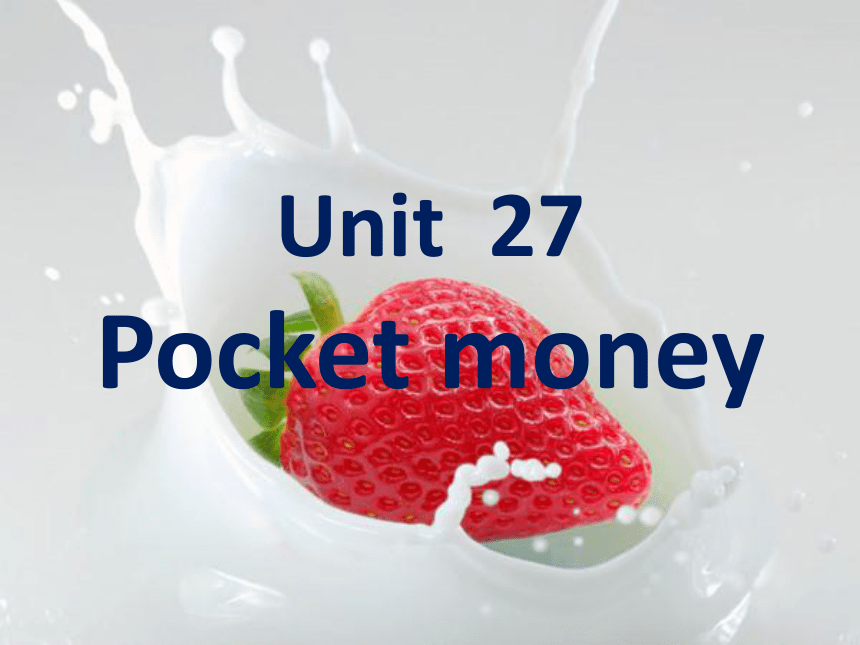
|
|
| 格式 | zip | ||
| 文件大小 | 7.3MB | ||
| 资源类型 | 教案 | ||
| 版本资源 | 新概念英语 | ||
| 科目 | 英语 | ||
| 更新时间 | 2019-06-20 11:26:27 | ||
图片预览

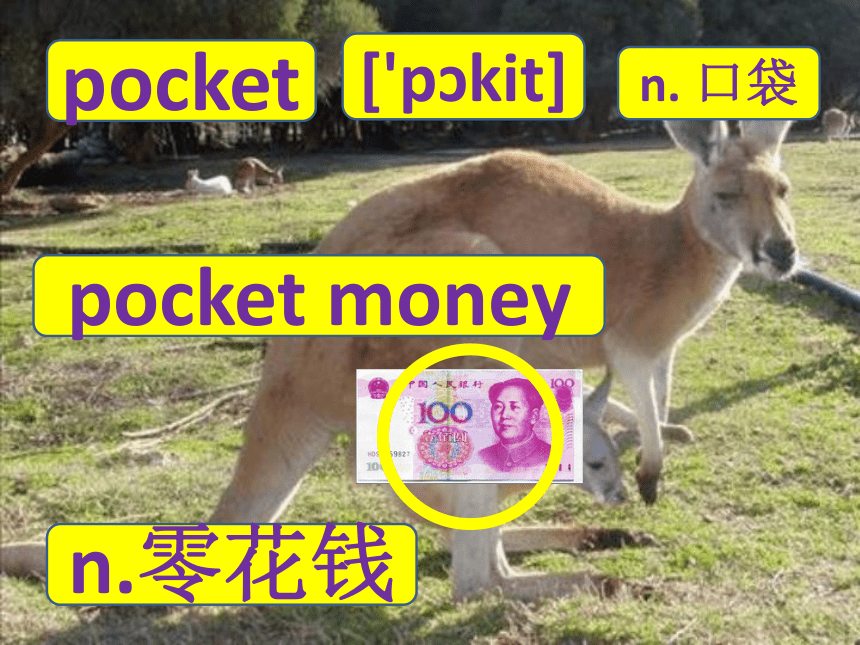


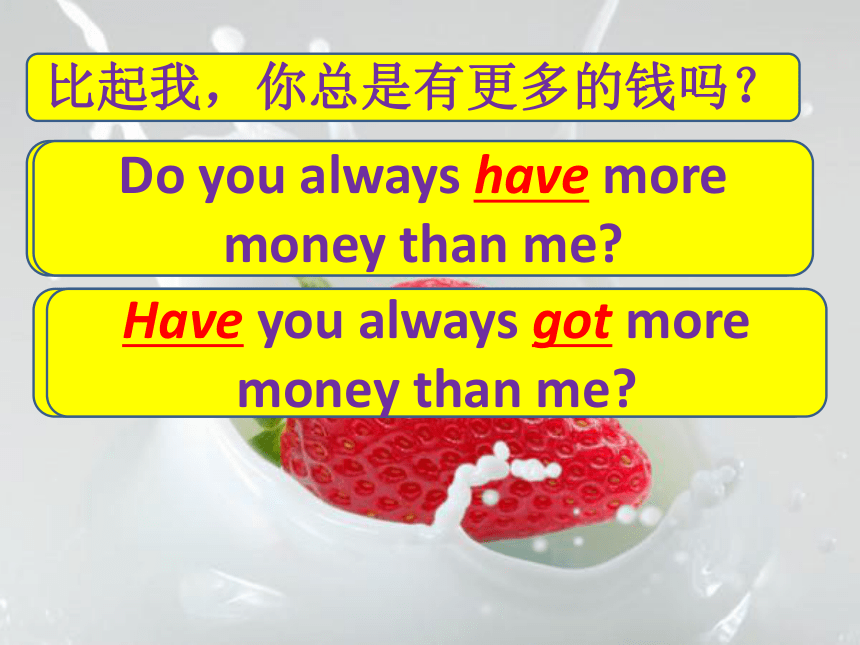




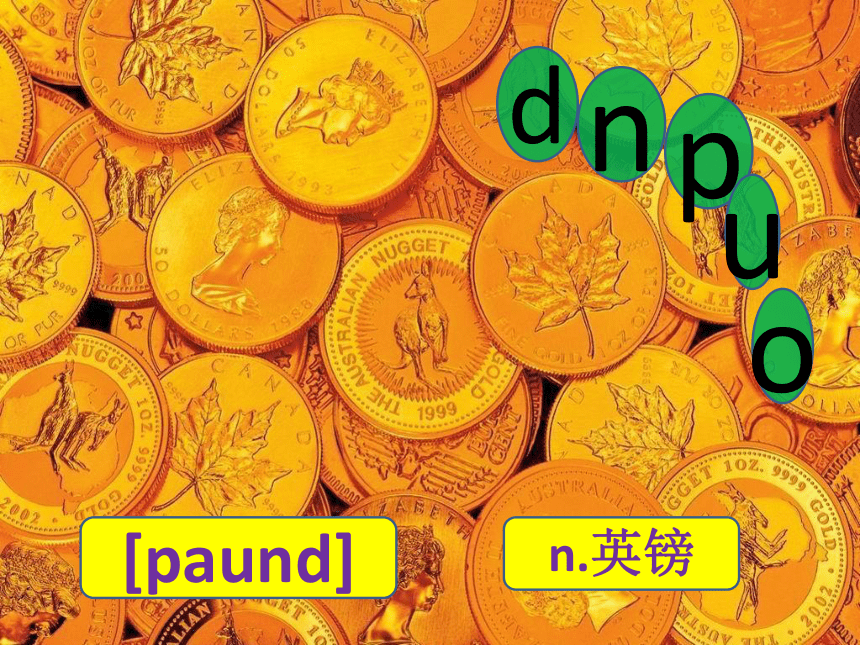

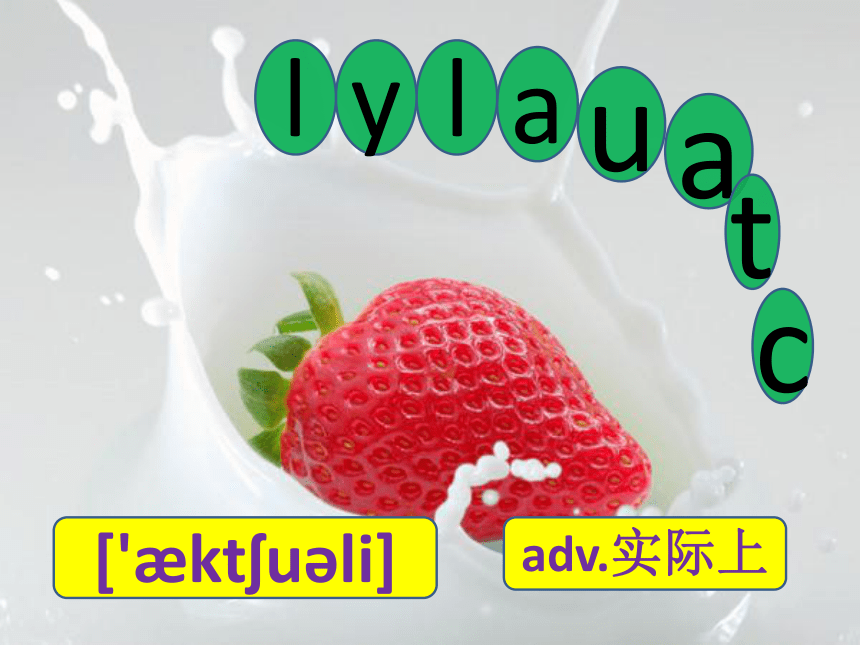
文档简介
课件68张PPT。Unit 27
Pocket moneypocket['p?kit] n. 口袋pocket moneyn.零花钱每月我都有许多零花钱。I have much pocket money every month.我比Lucy有更多的零花钱。I have more pocket money than Lucy.比起我,你总是有更多的钱。You always have more money than me.You have always got more money than me.have=have got比起我,你总是有更多的钱吗?You always have more money than me.You have always got more money than me.Do you always have more money than me?Have you always got more money than me?dl[lend]v. 借某物给某人ne你能借给我一些钱吗?Can you lend me some money?lend sb sth借给某人某事lend sth to sborb['b?r?u]v.向某人借某物row我能向你借一些钱吗?Can I borrow some money from you?borrow sth from sb向某人借某事dnp[paund]n.英镑uo你能借给我十英镑吗?Can you lend me ten pounds?我能向你借一百英镑吗?Can I borrow one hundred pounds from you?aua['?kt?u?li]adv.实际上tclyl实际上,他是一个相当坏的人。Actually he is a quite bad people. 她告诉她妈妈她今天早上六点起床,但实际上她四点半就起来了。She told her mum she got up at 6:00 but actually she got up at half past four.o[?un]adj.自己的nw你有你自己的钱吗?Do you have your own money?Have you got your own money?为什么你有你自己的钱?Why have you got your own money?为什么你没有你自己的钱?Why haven’t you got your own money?这是我自己的办公室。This is my own office.You need to do your homework
on your own.You need to do your homework by yourself.on one’s ownby oneself独自地你必须独自去英国。You must go to England on your own.You must go to England by yourself.Monday Tuesday Wednesday Thursday Friday Saturday Sunday is the beginning of a week. [bi'ɡini?] n.开端January is the beginning of a year. Which month is the beginning of a year? Which season is the beginning of a year? 哪个季节是一年的开端?春天是一年的开端。Spring is the beginning of a year. You always spend your pocket money at the beginning of every month.你总是在每个月的开端花掉你的零花钱。at the beginning of…在……的开端You always spend your pocket money at the beginning of every month.你总是在每个月的开端花掉你的零花钱。spendv.花费costSb spend some money on sth某人在某事上花费了一些钱我花了200元买了这个自行车。I spend two hundred yuan on this bike.It costs some money to do sth做某事花费了一些钱买这个自行车花了两百元。It costs two hundred yuan to buy this bike.I borrowed twenty dollars from Jack yesterday , and I will pay back the money in two weeks.昨天我向Jack借了20美元,并且我将两周后还钱。pay backv.偿还我将在星期日还给你。I’ll pay you back on Saturday.pay sb backv.偿还某人New words and Expressions['p?kit, m?ni]
[lend]
[paund]
['?kt?u?li]
[?un]
[bi'ɡini?]
[pei'b?k]
['b?r?u]pocket moneylendpound actuallyownbeginningpay backborrow any 疑问句、否定句表示不确定的数量
have got “拥有” money 为不可数名词不可数名词“少量、少许”,指前面提的moneyA littlelend me some。。。 Can you ---表示请求+不带to的不定式lend是借出去(借给他人,用lend sth to sb. 表示),borrow是借进来(从他人那里借某东西为己方所用,
用borrow sth. from sb.表示).eg.1.I lent him a pen.==I lent a pen to him. 2.I borrowed a pen from him.Just a few 只是少许Just for now/ a week/ a moment×How much +不可数名词(money/bread/time等)
This is much money.much用于疑问句/否定句。
1.a little/little(形容词)用在不可数名词之前: a little salt/little salt一点盐/没有多少盐2.a few/few(形容词)用在复数名词之前:a few people/few people有几个人/没有几个人 3.这四种形式也都能用做代词使用,或单独使用或与of连用: -Sugar? -A little,please.
-要糖吗? -请给一点儿。 Only a few of these are any good. 这其中只有几个用得着。4.s little/few 表示肯定“有一些”
little/few 表示“几乎没有”=to tell you the truth “实际上”actuallyThat’s a lot( of money).
在肯定句中a lot(of +不可数名词)your own money.
own是形容词 “自己的”get +名词/代词=“receive”
the same+名词your pocket money=yoursYou always spend/save---一般现在时表示永恒的事实
eg:You always study hard.at the beginning of the month---在动词短语后面,作时间状语。
at the end of the monthI’ll pay you back---
一般将来时表示对未来的允若或预测on Saturday—
on+星期几/日期
I watch TV on Fridays.
He married on March 9for—表示一段时间的介词You are the best (in the world)! 1.late [leit]
adj. 晚的;迟的;已故的;最近的
Sorry, I’m late.
He was late for the meeting.
adv. 晚;迟;最近;在晚期
[ 比较级later或latter 最高级latest 或last ]
2.drawer [dr?:] n. 抽屉;[会计] 开票人
画家 painter artist
Listening and UnderstandingPattern PracticeRobert 有一点钱。Robert has got a little money.Paul比Robert 有更少的钱。Paul has got less money than Robert has.Lucy有最少的钱。Lucy has got the least money.Lucy有大量的水果。Lucy has got a lot of fruit.Paul比Lucy有更多的水果。Paul has got more fruit than Lucy has.Robert有最多的水果。Robert has got the most fruit.Robert 有一点书。Robert has got a few books.Lucy比Robert 有更少的书。Lucy has got fewer books than Robert has.Paul有最少的书。Paul has got the fewest books.Robert 有大量的衣服。Robert has got a lot of clothes.Lucy比Robert有更多的衣服。Lucy has got more clothes than Robert has.Paul有最多的衣服。Paul has got the most clothes.ListeningThank you for listening!
I love you!
on your own.You need to do your homework by yourself.on one’s ownby oneself独自地你必须独自去英国。You must go to England on your own.You must go to England by yourself.Monday Tuesday Wednesday Thursday Friday Saturday Sunday is the beginning of a week. [bi'ɡini?] n.开端January is the beginning of a year. Which month is the beginning of a year? Which season is the beginning of a year? 哪个季节是一年的开端?春天是一年的开端。Spring is the beginning of a year. You always spend your pocket money at the beginning of every month.你总是在每个月的开端花掉你的零花钱。at the beginning of…在……的开端You always spend your pocket money at the beginning of every month.你总是在每个月的开端花掉你的零花钱。spendv.花费costSb spend some money on sth某人在某事上花费了一些钱我花了200元买了这个自行车。I spend two hundred yuan on this bike.It costs some money to do sth做某事花费了一些钱买这个自行车花了两百元。It costs two hundred yuan to buy this bike.I borrowed twenty dollars from Jack yesterday , and I will pay back the money in two weeks.昨天我向Jack借了20美元,并且我将两周后还钱。pay backv.偿还我将在星期日还给你。I’ll pay you back on Saturday.pay sb backv.偿还某人New words and Expressions['p?kit, m?ni]
[lend]
[paund]
['?kt?u?li]
[?un]
[bi'ɡini?]
[pei'b?k]
['b?r?u]pocket moneylendpound actuallyownbeginningpay backborrow any 疑问句、否定句表示不确定的数量
have got “拥有” money 为不可数名词不可数名词“少量、少许”,指前面提的moneyA littlelend me some。。。 Can you ---表示请求+不带to的不定式lend是借出去(借给他人,用lend sth to sb. 表示),borrow是借进来(从他人那里借某东西为己方所用,
用borrow sth. from sb.表示).eg.1.I lent him a pen.==I lent a pen to him. 2.I borrowed a pen from him.Just a few 只是少许Just for now/ a week/ a moment×How much +不可数名词(money/bread/time等)
This is much money.much用于疑问句/否定句。
1.a little/little(形容词)用在不可数名词之前: a little salt/little salt一点盐/没有多少盐2.a few/few(形容词)用在复数名词之前:a few people/few people有几个人/没有几个人 3.这四种形式也都能用做代词使用,或单独使用或与of连用: -Sugar? -A little,please.
-要糖吗? -请给一点儿。 Only a few of these are any good. 这其中只有几个用得着。4.s little/few 表示肯定“有一些”
little/few 表示“几乎没有”=to tell you the truth “实际上”actuallyThat’s a lot( of money).
在肯定句中a lot(of +不可数名词)your own money.
own是形容词 “自己的”get +名词/代词=“receive”
the same+名词your pocket money=yoursYou always spend/save---一般现在时表示永恒的事实
eg:You always study hard.at the beginning of the month---在动词短语后面,作时间状语。
at the end of the monthI’ll pay you back---
一般将来时表示对未来的允若或预测on Saturday—
on+星期几/日期
I watch TV on Fridays.
He married on March 9for—表示一段时间的介词You are the best (in the world)! 1.late [leit]
adj. 晚的;迟的;已故的;最近的
Sorry, I’m late.
He was late for the meeting.
adv. 晚;迟;最近;在晚期
[ 比较级later或latter 最高级latest 或last ]
2.drawer [dr?:] n. 抽屉;[会计] 开票人
画家 painter artist
Listening and UnderstandingPattern PracticeRobert 有一点钱。Robert has got a little money.Paul比Robert 有更少的钱。Paul has got less money than Robert has.Lucy有最少的钱。Lucy has got the least money.Lucy有大量的水果。Lucy has got a lot of fruit.Paul比Lucy有更多的水果。Paul has got more fruit than Lucy has.Robert有最多的水果。Robert has got the most fruit.Robert 有一点书。Robert has got a few books.Lucy比Robert 有更少的书。Lucy has got fewer books than Robert has.Paul有最少的书。Paul has got the fewest books.Robert 有大量的衣服。Robert has got a lot of clothes.Lucy比Robert有更多的衣服。Lucy has got more clothes than Robert has.Paul有最多的衣服。Paul has got the most clothes.ListeningThank you for listening!
I love you!
同课章节目录
- Unit 16 What's your middle name?
- Unit 17 A cuckooin the nest
- Unit 18 Read the label!
- Unit 19 Aproblem with squirrels
- Unit 20 An ordinery life
- Unit 21 The weather forecast
- Unit 22 I always behave myself!
- Unit 23 Quite tall...and quite steiking!
- Unit 24 A quiz
- Unit 25 Karen saves some money
- Unit 26 School reports
- Unit 27 Pocket money
- Unit 28 She doesn't even exist!
- Unit 29 No one's better than Paul!
- Unit 30 A giant squid
